2022年中考复习语法之代词课件30张
文档属性
| 名称 | 2022年中考复习语法之代词课件30张 | 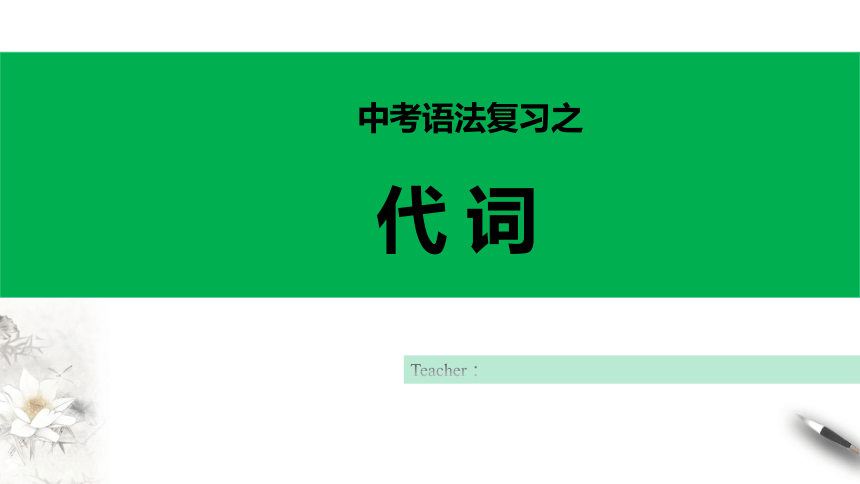 | |
| 格式 | pptx | ||
| 文件大小 | 442.2KB | ||
| 资源类型 | 教案 | ||
| 版本资源 | 通用版 | ||
| 科目 | 英语 | ||
| 更新时间 | 2021-12-26 12:13:14 | ||
图片预览

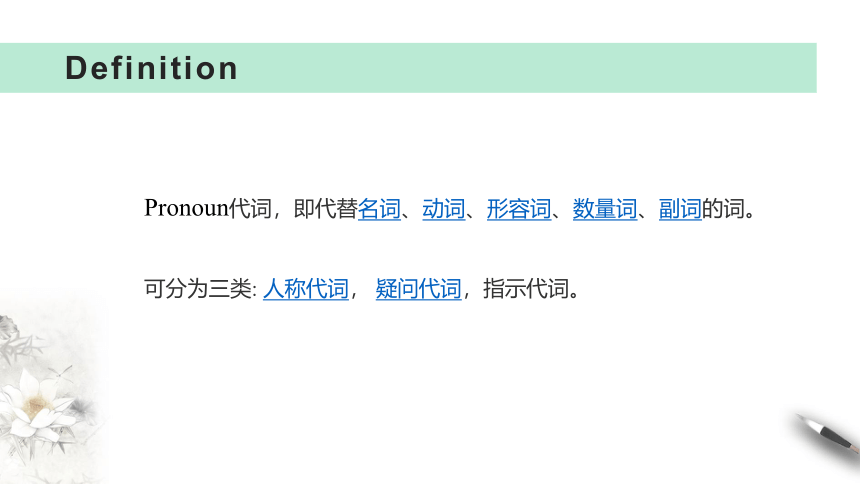
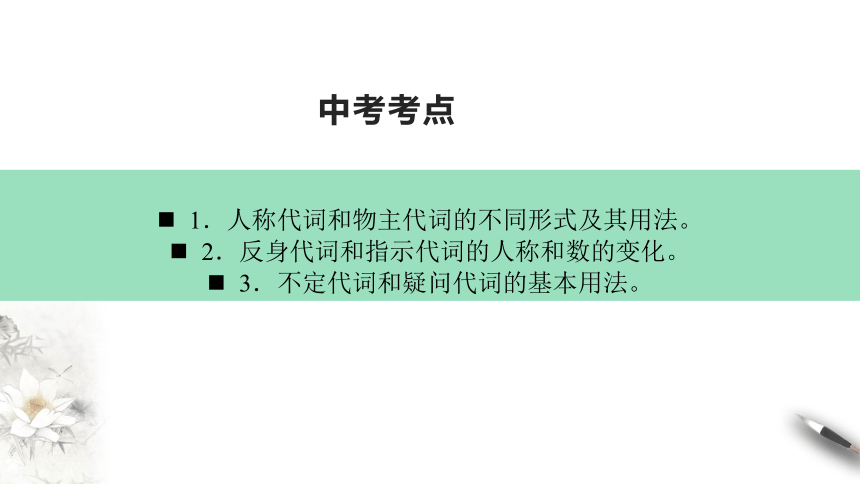
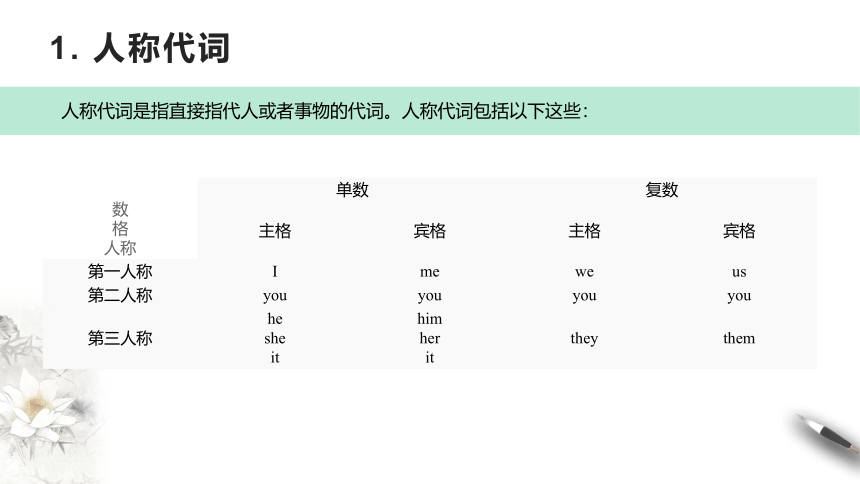
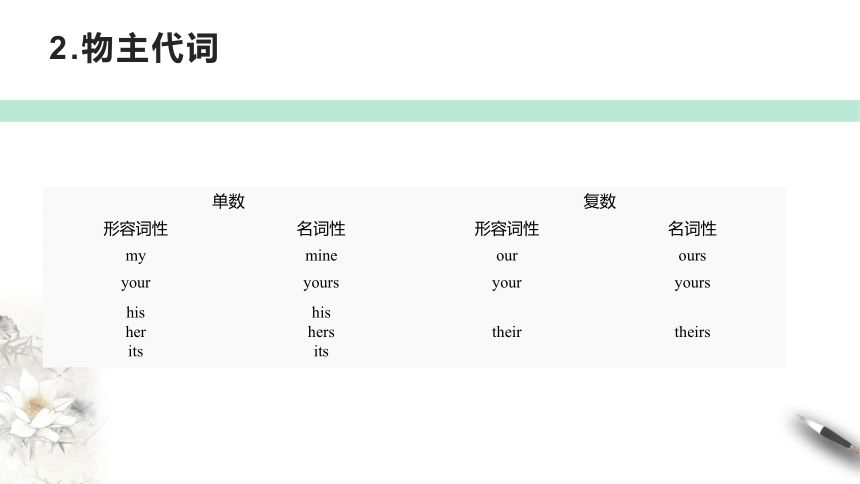
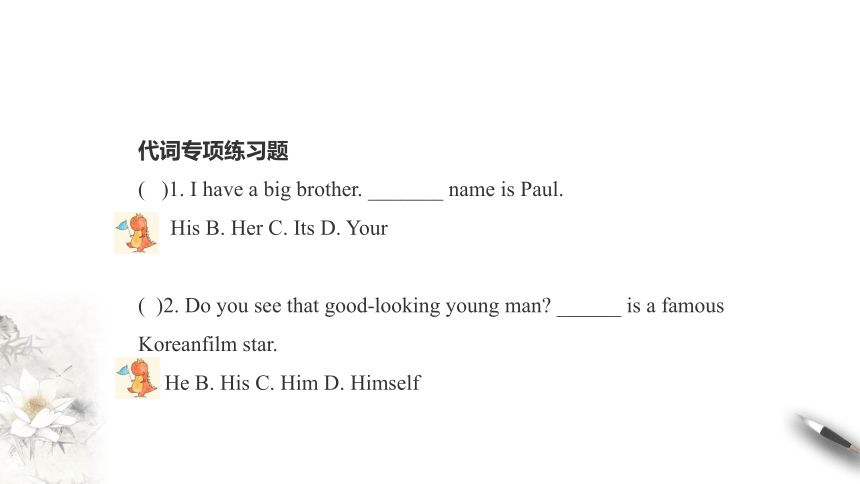
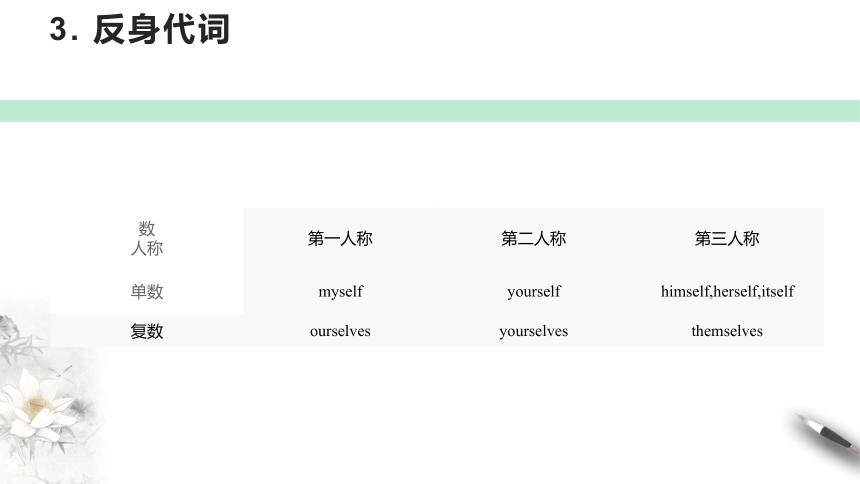
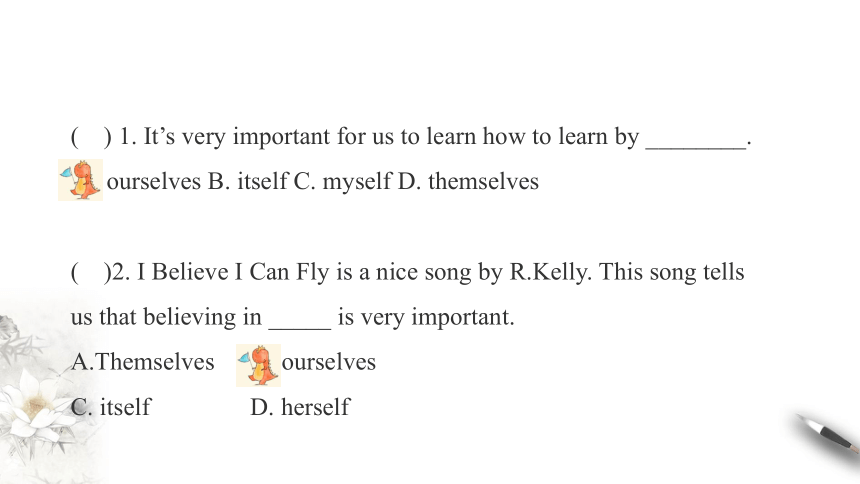
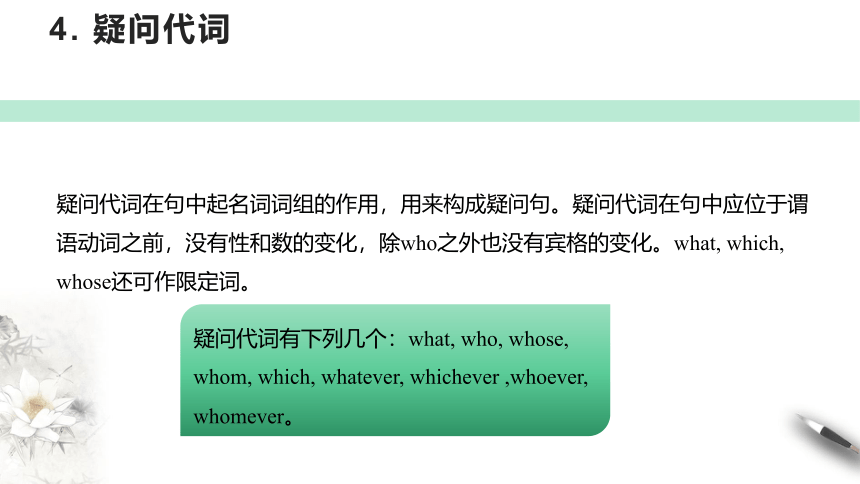
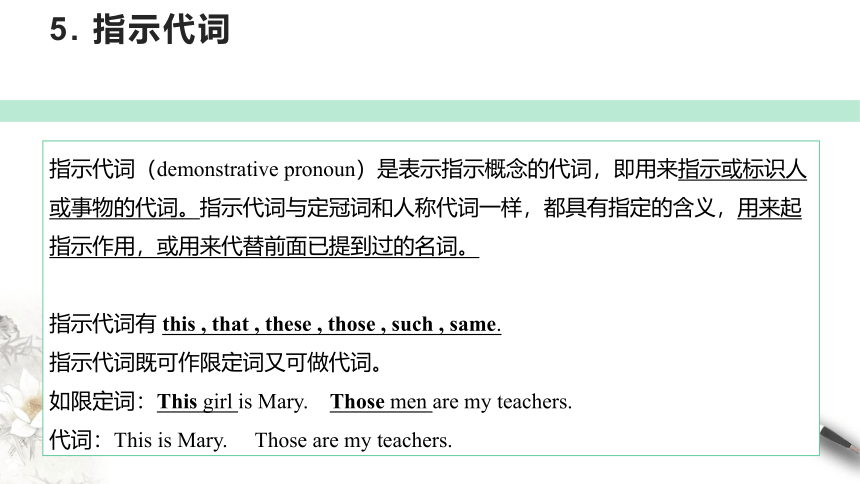
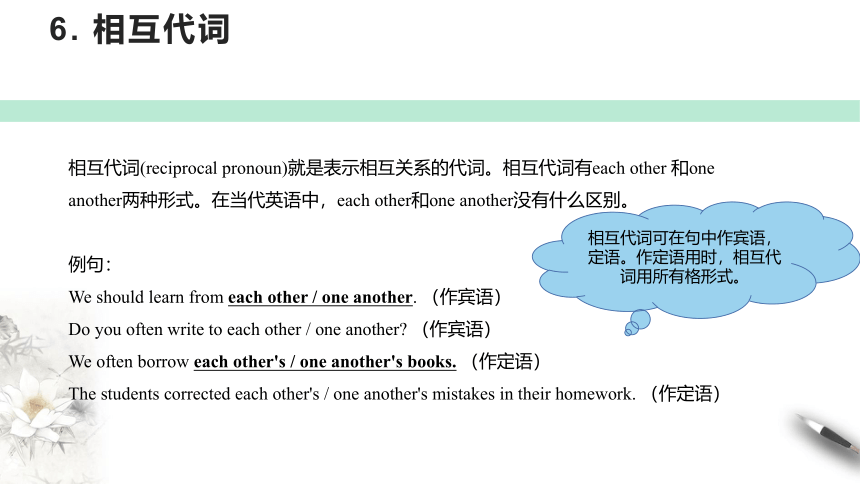
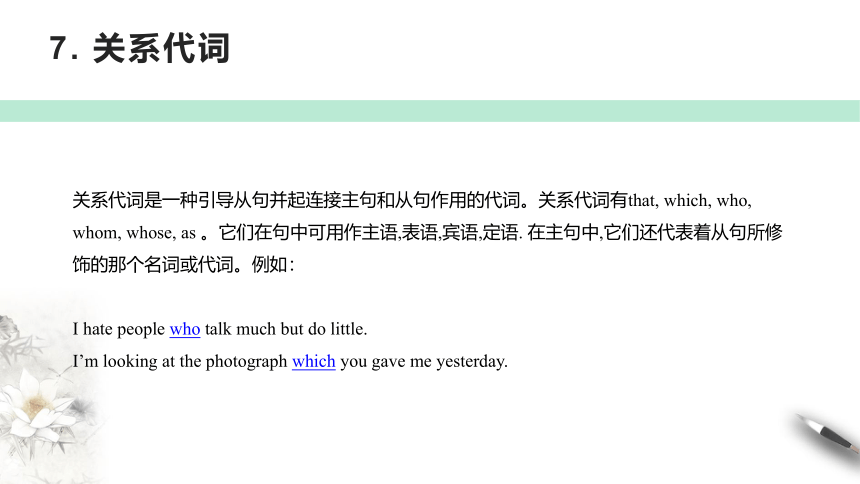
文档简介
(共30张PPT)
中考语法复习之
代 词
Teacher :
Definition
Pronoun代词,即代替名词、动词、形容词、数量词、副词的词。
可分为三类: 人称代词, 疑问代词,指示代词。
中考考点
1.人称代词和物主代词的不同形式及其用法。
2.反身代词和指示代词的人称和数的变化。
3.不定代词和疑问代词的基本用法。
1. 人称代词
数 格 人称 单数 复数 主格 宾格 主格 宾格
第一人称 I me we us
第二人称 you you you you
第三人称 he
she
it him
her
it they them
人称代词是指直接指代人或者事物的代词。人称代词包括以下这些:
2.物主代词
单数 复数 形容词性 名词性 形容词性 名词性
my mine our ours
your yours your yours
his
her
its his
hers
its their theirs
代词专项练习题
( )1. I have a big brother. _______ name is Paul.
His B. Her C. Its D. Your
( )2. Do you see that good-looking young man ______ is a famous Koreanfilm star.
A. He B. His C. Him D. Himself
3. 反身代词
数 人称 第一人称 第二人称 第三人称
单数 myself yourself himself,herself,itself
复数 ourselves yourselves themselves
( ) 1. It’s very important for us to learn how to learn by ________.
ourselves B. itself C. myself D. themselves
( )2. I Believe I Can Fly is a nice song by R.Kelly. This song tells us that believing in _____ is very important.
A.Themselves B. ourselves
C. itself D. herself
4. 疑问代词
疑问代词在句中起名词词组的作用,用来构成疑问句。疑问代词在句中应位于谓语动词之前,没有性和数的变化,除who之外也没有宾格的变化。what, which, whose还可作限定词。
疑问代词有下列几个:what, who, whose, whom, which, whatever, whichever ,whoever, whomever。
5. 指示代词
指示代词(demonstrative pronoun)是表示指示概念的代词,即用来指示或标识人或事物的代词。指示代词与定冠词和人称代词一样,都具有指定的含义,用来起指示作用,或用来代替前面已提到过的名词。
指示代词有 this , that , these , those , such , same.
指示代词既可作限定词又可做代词。
如限定词:This girl is Mary. Those men are my teachers.
代词:This is Mary. Those are my teachers.
6. 相互代词
相互代词(reciprocal pronoun)就是表示相互关系的代词。相互代词有each other 和one another两种形式。在当代英语中,each other和one another没有什么区别。
例句:
We should learn from each other / one another. (作宾语)
Do you often write to each other / one another (作宾语)
We often borrow each other's / one another's books. (作定语)
The students corrected each other's / one another's mistakes in their homework. (作定语)
相互代词可在句中作宾语,定语。作定语用时,相互代词用所有格形式。
7. 关系代词
关系代词是一种引导从句并起连接主句和从句作用的代词。关系代词有that, which, who, whom, whose, as 。它们在句中可用作主语,表语,宾语,定语. 在主句中,它们还代表着从句所修饰的那个名词或代词。例如:
I hate people who talk much but do little.
I’m looking at the photograph which you gave me yesterday.
8. 连接代词
疑问代词在引起从句时,都称为连接代词。连接代词主要有who,whom,whose,what,which,whoever,whomever,whosever,whatever,which ev er等。连接代词一般指疑问,但what,whatever除了指疑问之外,也可指陈述。
例句:
It is clear enough what she meant. 她是什么意思很清楚。(主语从句)
I don’t care what they think. 他们怎么想我不管。(宾语从句)
The question is who(m) we should trust.问题是我们应当相信谁。(表语从句)
( ) 1 Please find out ____ he is looking after at home.
A. who B. which C. whom D. when
( ) 2 ____ do you think you should help
A. Whose B. Which C. What D. Whom
( ) 3 He told me ___ he was sent for.
A. whom B. that C. both D. where
9. 替代词
例句:
I lost my old camera; this is a new one.(替代表泛指的单数名词)
The weather here is too cold. I don’t like it.(it在此就指前面提到的the weather)
Hard beds are healthier than soft ones.(替代表泛指的复数名词)
I’d like to try on those shoes. The ones at the front of the window.(替代表特指的复数名词)
替代词就是指用来替代前面已经出现过的名词。使句子看起来简洁明了。常用的替代词如it, one, ones, that, those等。
( ) 1 The man missed the bus. ____ is why he was late for the meeting.
A. It B. That C. This D. All
( ) 2 He has to stay at home. ___ he has a bad cold.
A. This is because B. That's why C. So is it D. The reason is
( ) 3 -How many books are there on the table
-Only four.
A. This is all right B. That's all right C. That's right D. It is all right
10. 不定代词
1.定义
不指明代替任何特定名词或形容词的代词叫做不定代词。不定代词大都可以代替名词和形容词。多数可以作主语、宾语、表语或定语。常见的不定代词有:some, any, no, none, one, all, every, each, other, another, either, neither, both, many, much, (a)few, (a)little, a lot of, lots of以及some, any, no, every与thing, body或one构成的复合不定代词。
2.常用的意义相近的不定代词之间的辨析
(1)few, a few, little与a little
2.常用的意义相近的不定代词之间的辨析
(1)few, a few, little与a little
He has _________ friends,but he has ______ good friends.
There's still ___________milk in the fridge,but there's ______ bread.
a few
few
a little
little
He has _________ friends,but he has ______ good friends.
There's still ___________meat at home,but there's ______ bread.
(2)some与any
①二者均表示“一些”,既可以修饰可数名词,也可以修饰不可数名词。some一般用于肯定句,any一般用于疑问句、否定句。
②在疑问句中,表示说话人希望得到肯定回答或表示请求、建议时用some。如:
Would you like some coffee
a few
few
a little
little
( ) 1 I didn't get any letters yesterday, but there were____ this morning.
A. a little B. few C. little D. a few
( ) 2 The film isn't interesting. ___ people like it.
A. Few B. A little C. A few D. Little
( ) 3 She can speak ___ English now.
A. a little B. a few C. many D. few
( ) 4 Hurry up! There is____ time left.
A. few B. a few C. little D. a little
( ) 5 Sorry, I can't answer your question. I know____ about the subject.
A. a little B. little C. few D. a few
1-5 D A A D B
(3)both, all, neither, either, any与none
My parents are ________ doctors.
There are some trees on ________ side of the road.
I like ________ of these two dresses.
both
either
neither
( ) 1 _____ of them has an English dictionary.
A. Every B. All C. Both D. Each
( ) 2 There are lots of English books here, and ____ of them is easy to understand.
A. both B. all .C. every D. each
( ) 3 I didn't know that you___would___there.
A. be; all B. all; be C. are; all D: all; are
( ) 4 -Are these two books interesting
-Yes, ____ of them are interesting.
A. both B. all C. either D. neither
(4)many, much与a lot of
三者都表示“许多”。其中many 和much 常用于否定句和疑问句中;
肯定句中常用a lot of 。many修饰可数名词复数;much修饰不可数名词;a lot of(=lots of)既可以修饰可数名词复数,又可以修饰不可数名词。
(5)each与every
两者都表示“每个,各个”,each强调每个人或事物的个别情况,即强调个体; every有“全体”的意思,即强调整体。如:
________ of them has a flower.
__________ second is important to us.
。
Each
Every
(6)another,(the)other与(the)others
other泛指“另外的”,不能单独使用,后接名词。
others等于“other+复数名词”,泛指“别的人或物”;
the other(+单数可数名词)指“两者中的另一个”,常用于“one…the other…”结构。
the others等于“the other+复数名词”,表示“其余所有的人或物”。
another 泛指“三者或三者以上中的另一个”。如:
Do you have any other ideas 你有别的想法吗?
I have two brothers.__________ is a doctor,__________ is a teacher.
He is always ready to help __________.
Five of them are in the classroom. What about __________?
Don't lose heart. Have __________ try.
One
the other
others
the others
another
(7)复合不定代词
指代人的有: someone/somebody(某人), anyone/anybody(任何人), nobody(没人), everyone/everybody(每个人)。
指代事物的有: something(某事,某物), anything(任何事), nothing(没什么),everything(每件事,一切)。
anything important
knows
请注意以下几点:
① 以some和any开头的复合不定代词的用法和some, any的用法一样。(some和any的用法见上文)
② 修饰复合不定代词的形容词要放在其后。如:
Is there ___________________ in today's newspaper
③ 复合不定代词作主语视为单数。如:
Nobody __________ why she is here.
Exercises
用所给词的适当形式填空
1.Mrs Lei teaches ________ (we) English this term.
2.This isn't ________ (she) book. She lost hers.
3.My schoolbag is the same as ________ (her).
4.They enjoyed ___________ (they) at the party.
5.________ (this) blue dresses look very nice.
6.Everyone in our class ________ (study) hard every day.
7.He doesn't have ________ (something) to do.
8.________ (whom) spoke at the meeting
9.Help ________ (yourself), Jack.
us
her
hers
themselves
These
studies
anything
Who
考点过关
yourself
考点过关
10.Shall we wait for ________ (she) at the school gate
11._______ (we)teachers are very friendly to us.
12.Simon is a friend of ________ ( I ). We often help each other.
13.That's my brother. ________ (him) is reading a newspaper.
14.She cooked dinner by ________ (she).
15.Linda didn’t bring her dictionary here. So I lent _______ to _______.
16.I think the car can't be ______ ( he).
17.Jane is sitting between Jean and ______ (my).
18.Their books are older than _______ (we).
19. I feel my stomach terrible. I think I ate _________ at lunchtime.
20. NewZealand has two islands. One is North Island and _______ is South Island.
her
Our
mine
He
herself
hers
his
me
ours
Something bad
the other
her
代词表格
单数 复数 第一人称 第二人称 第三人称 第一人称 第二人称 第三人称
人称代词 主格 I you he,she,it we you they
宾格 me you him,her,it us you them
物主代词 形容词性 my your his,her,its our your their
名词性 mine yours his,hers,its ours yours theirs
反身代词 myself yourself himself, herself, itself ourselves yourselves themselves
指示代词 this,that these,those 相互代词 宾格 each other one another 所有格 each other's one another's 代词表格
指示代词 this,that these,those
相互代词 宾格 each other one another
所有格 each other's one another's
不定代词 可数 each,one,many,(a) few,both,another,either,neither 不可数 much,(a) little 可数、不可数 all,some,none,such,any,other 复合 anybody,anyone,anything,somebody,someone,something,nobody,nothing,everybody,everyone,everything 疑问代词 who,whom,whose,which,what 连接代词 who(ever),whom(ever),whose(ever),which(ever),what(ever) 关系代词 who,whom,whose,which,that,as
中考语法复习之
代 词
Teacher :
Definition
Pronoun代词,即代替名词、动词、形容词、数量词、副词的词。
可分为三类: 人称代词, 疑问代词,指示代词。
中考考点
1.人称代词和物主代词的不同形式及其用法。
2.反身代词和指示代词的人称和数的变化。
3.不定代词和疑问代词的基本用法。
1. 人称代词
数 格 人称 单数 复数 主格 宾格 主格 宾格
第一人称 I me we us
第二人称 you you you you
第三人称 he
she
it him
her
it they them
人称代词是指直接指代人或者事物的代词。人称代词包括以下这些:
2.物主代词
单数 复数 形容词性 名词性 形容词性 名词性
my mine our ours
your yours your yours
his
her
its his
hers
its their theirs
代词专项练习题
( )1. I have a big brother. _______ name is Paul.
His B. Her C. Its D. Your
( )2. Do you see that good-looking young man ______ is a famous Koreanfilm star.
A. He B. His C. Him D. Himself
3. 反身代词
数 人称 第一人称 第二人称 第三人称
单数 myself yourself himself,herself,itself
复数 ourselves yourselves themselves
( ) 1. It’s very important for us to learn how to learn by ________.
ourselves B. itself C. myself D. themselves
( )2. I Believe I Can Fly is a nice song by R.Kelly. This song tells us that believing in _____ is very important.
A.Themselves B. ourselves
C. itself D. herself
4. 疑问代词
疑问代词在句中起名词词组的作用,用来构成疑问句。疑问代词在句中应位于谓语动词之前,没有性和数的变化,除who之外也没有宾格的变化。what, which, whose还可作限定词。
疑问代词有下列几个:what, who, whose, whom, which, whatever, whichever ,whoever, whomever。
5. 指示代词
指示代词(demonstrative pronoun)是表示指示概念的代词,即用来指示或标识人或事物的代词。指示代词与定冠词和人称代词一样,都具有指定的含义,用来起指示作用,或用来代替前面已提到过的名词。
指示代词有 this , that , these , those , such , same.
指示代词既可作限定词又可做代词。
如限定词:This girl is Mary. Those men are my teachers.
代词:This is Mary. Those are my teachers.
6. 相互代词
相互代词(reciprocal pronoun)就是表示相互关系的代词。相互代词有each other 和one another两种形式。在当代英语中,each other和one another没有什么区别。
例句:
We should learn from each other / one another. (作宾语)
Do you often write to each other / one another (作宾语)
We often borrow each other's / one another's books. (作定语)
The students corrected each other's / one another's mistakes in their homework. (作定语)
相互代词可在句中作宾语,定语。作定语用时,相互代词用所有格形式。
7. 关系代词
关系代词是一种引导从句并起连接主句和从句作用的代词。关系代词有that, which, who, whom, whose, as 。它们在句中可用作主语,表语,宾语,定语. 在主句中,它们还代表着从句所修饰的那个名词或代词。例如:
I hate people who talk much but do little.
I’m looking at the photograph which you gave me yesterday.
8. 连接代词
疑问代词在引起从句时,都称为连接代词。连接代词主要有who,whom,whose,what,which,whoever,whomever,whosever,whatever,which ev er等。连接代词一般指疑问,但what,whatever除了指疑问之外,也可指陈述。
例句:
It is clear enough what she meant. 她是什么意思很清楚。(主语从句)
I don’t care what they think. 他们怎么想我不管。(宾语从句)
The question is who(m) we should trust.问题是我们应当相信谁。(表语从句)
( ) 1 Please find out ____ he is looking after at home.
A. who B. which C. whom D. when
( ) 2 ____ do you think you should help
A. Whose B. Which C. What D. Whom
( ) 3 He told me ___ he was sent for.
A. whom B. that C. both D. where
9. 替代词
例句:
I lost my old camera; this is a new one.(替代表泛指的单数名词)
The weather here is too cold. I don’t like it.(it在此就指前面提到的the weather)
Hard beds are healthier than soft ones.(替代表泛指的复数名词)
I’d like to try on those shoes. The ones at the front of the window.(替代表特指的复数名词)
替代词就是指用来替代前面已经出现过的名词。使句子看起来简洁明了。常用的替代词如it, one, ones, that, those等。
( ) 1 The man missed the bus. ____ is why he was late for the meeting.
A. It B. That C. This D. All
( ) 2 He has to stay at home. ___ he has a bad cold.
A. This is because B. That's why C. So is it D. The reason is
( ) 3 -How many books are there on the table
-Only four.
A. This is all right B. That's all right C. That's right D. It is all right
10. 不定代词
1.定义
不指明代替任何特定名词或形容词的代词叫做不定代词。不定代词大都可以代替名词和形容词。多数可以作主语、宾语、表语或定语。常见的不定代词有:some, any, no, none, one, all, every, each, other, another, either, neither, both, many, much, (a)few, (a)little, a lot of, lots of以及some, any, no, every与thing, body或one构成的复合不定代词。
2.常用的意义相近的不定代词之间的辨析
(1)few, a few, little与a little
2.常用的意义相近的不定代词之间的辨析
(1)few, a few, little与a little
He has _________ friends,but he has ______ good friends.
There's still ___________milk in the fridge,but there's ______ bread.
a few
few
a little
little
He has _________ friends,but he has ______ good friends.
There's still ___________meat at home,but there's ______ bread.
(2)some与any
①二者均表示“一些”,既可以修饰可数名词,也可以修饰不可数名词。some一般用于肯定句,any一般用于疑问句、否定句。
②在疑问句中,表示说话人希望得到肯定回答或表示请求、建议时用some。如:
Would you like some coffee
a few
few
a little
little
( ) 1 I didn't get any letters yesterday, but there were____ this morning.
A. a little B. few C. little D. a few
( ) 2 The film isn't interesting. ___ people like it.
A. Few B. A little C. A few D. Little
( ) 3 She can speak ___ English now.
A. a little B. a few C. many D. few
( ) 4 Hurry up! There is____ time left.
A. few B. a few C. little D. a little
( ) 5 Sorry, I can't answer your question. I know____ about the subject.
A. a little B. little C. few D. a few
1-5 D A A D B
(3)both, all, neither, either, any与none
My parents are ________ doctors.
There are some trees on ________ side of the road.
I like ________ of these two dresses.
both
either
neither
( ) 1 _____ of them has an English dictionary.
A. Every B. All C. Both D. Each
( ) 2 There are lots of English books here, and ____ of them is easy to understand.
A. both B. all .C. every D. each
( ) 3 I didn't know that you___would___there.
A. be; all B. all; be C. are; all D: all; are
( ) 4 -Are these two books interesting
-Yes, ____ of them are interesting.
A. both B. all C. either D. neither
(4)many, much与a lot of
三者都表示“许多”。其中many 和much 常用于否定句和疑问句中;
肯定句中常用a lot of 。many修饰可数名词复数;much修饰不可数名词;a lot of(=lots of)既可以修饰可数名词复数,又可以修饰不可数名词。
(5)each与every
两者都表示“每个,各个”,each强调每个人或事物的个别情况,即强调个体; every有“全体”的意思,即强调整体。如:
________ of them has a flower.
__________ second is important to us.
。
Each
Every
(6)another,(the)other与(the)others
other泛指“另外的”,不能单独使用,后接名词。
others等于“other+复数名词”,泛指“别的人或物”;
the other(+单数可数名词)指“两者中的另一个”,常用于“one…the other…”结构。
the others等于“the other+复数名词”,表示“其余所有的人或物”。
another 泛指“三者或三者以上中的另一个”。如:
Do you have any other ideas 你有别的想法吗?
I have two brothers.__________ is a doctor,__________ is a teacher.
He is always ready to help __________.
Five of them are in the classroom. What about __________?
Don't lose heart. Have __________ try.
One
the other
others
the others
another
(7)复合不定代词
指代人的有: someone/somebody(某人), anyone/anybody(任何人), nobody(没人), everyone/everybody(每个人)。
指代事物的有: something(某事,某物), anything(任何事), nothing(没什么),everything(每件事,一切)。
anything important
knows
请注意以下几点:
① 以some和any开头的复合不定代词的用法和some, any的用法一样。(some和any的用法见上文)
② 修饰复合不定代词的形容词要放在其后。如:
Is there ___________________ in today's newspaper
③ 复合不定代词作主语视为单数。如:
Nobody __________ why she is here.
Exercises
用所给词的适当形式填空
1.Mrs Lei teaches ________ (we) English this term.
2.This isn't ________ (she) book. She lost hers.
3.My schoolbag is the same as ________ (her).
4.They enjoyed ___________ (they) at the party.
5.________ (this) blue dresses look very nice.
6.Everyone in our class ________ (study) hard every day.
7.He doesn't have ________ (something) to do.
8.________ (whom) spoke at the meeting
9.Help ________ (yourself), Jack.
us
her
hers
themselves
These
studies
anything
Who
考点过关
yourself
考点过关
10.Shall we wait for ________ (she) at the school gate
11._______ (we)teachers are very friendly to us.
12.Simon is a friend of ________ ( I ). We often help each other.
13.That's my brother. ________ (him) is reading a newspaper.
14.She cooked dinner by ________ (she).
15.Linda didn’t bring her dictionary here. So I lent _______ to _______.
16.I think the car can't be ______ ( he).
17.Jane is sitting between Jean and ______ (my).
18.Their books are older than _______ (we).
19. I feel my stomach terrible. I think I ate _________ at lunchtime.
20. NewZealand has two islands. One is North Island and _______ is South Island.
her
Our
mine
He
herself
hers
his
me
ours
Something bad
the other
her
代词表格
单数 复数 第一人称 第二人称 第三人称 第一人称 第二人称 第三人称
人称代词 主格 I you he,she,it we you they
宾格 me you him,her,it us you them
物主代词 形容词性 my your his,her,its our your their
名词性 mine yours his,hers,its ours yours theirs
反身代词 myself yourself himself, herself, itself ourselves yourselves themselves
指示代词 this,that these,those 相互代词 宾格 each other one another 所有格 each other's one another's 代词表格
指示代词 this,that these,those
相互代词 宾格 each other one another
所有格 each other's one another's
不定代词 可数 each,one,many,(a) few,both,another,either,neither 不可数 much,(a) little 可数、不可数 all,some,none,such,any,other 复合 anybody,anyone,anything,somebody,someone,something,nobody,nothing,everybody,everyone,everything 疑问代词 who,whom,whose,which,what 连接代词 who(ever),whom(ever),whose(ever),which(ever),what(ever) 关系代词 who,whom,whose,which,that,as
同课章节目录
- 词法
- 名词
- 动词和动词短语
- 动词语态
- 动词时态
- 助动词和情态动词
- 非谓语动词
- 冠词
- 代词
- 数词和量词
- 形容词副词及其比较等级
- 介词和介词短语
- 连词和感叹词
- 构词法
- 相似、相近词比较
- 句法
- 陈述句
- 一般疑问句和否定疑问句
- 特殊疑问句及选择疑问句
- 反意疑问句
- 存在句(There be句型)
- 宾语从句
- 定语从句
- 状语从句
- 主谓一致问题
- 简单句
- 并列句
- 复合句
- 主谓一致
- 主、表语从句
- 名词性从句
- 直接引语和间接引语
- 虚拟语气
- 感叹句
- 强调句
- 倒装句
- 祈使句
- 句子的成分
- 句子的分类
- 题型专区
- 单项选择部分
- 易错题
- 完形填空
- 阅读理解
- 词汇练习
- 听说训练
- 句型转换
- 补全对话
- 短文改错
- 翻译
- 书面表达
- 任务型阅读
- 语法填空
- 其他资料
